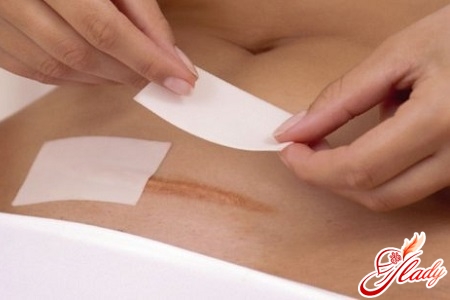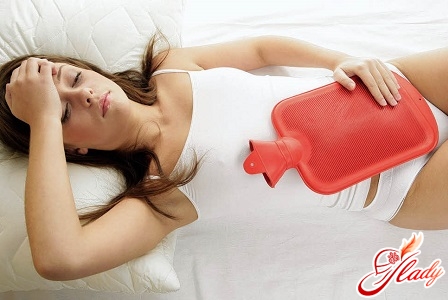 In our time, the appearance of man in the world is notthe mystery of nature, and nothing else but medical manipulation. And the caesarean section is a surgical operation. And, unfortunately, doctors have recently resorted to cesarean section more and more often. Moreover - very many future mothers themselves ask doctors about this operation, fearing pain. It would seem that the ideal option is neither pain nor fear. But if women knew in advance what awaits them in the postoperative period, the ranks of thirsty caesarean sections would be greatly thinned. And not by accident - some painful sensations of what are! Whatever good specialist does not perform the operation, tissue damage is inevitable. And time for their healing will take a lot - sometimes young moms complain that they have a stomach ache after cesarean section and after a lapse of six months. But sometimes the caesarean section is the only way of delivery, which allows to keep health to mother and baby. And there is nowhere to go - as they say, from two evils it is necessary to choose less. But in any case - whether this is your decision, or forced - be prepared for an uneasy recovery period, the main discomfort during which there will be pain. In order to get rid of the pain, you need to understand the reasons for its occurrence - otherwise the fight will be unsuccessful. Of course, first of all you should consult a doctor - only he can establish the cause reliably and quickly. But the woman herself has a little knowledge, of course, it will not hurt.
In our time, the appearance of man in the world is notthe mystery of nature, and nothing else but medical manipulation. And the caesarean section is a surgical operation. And, unfortunately, doctors have recently resorted to cesarean section more and more often. Moreover - very many future mothers themselves ask doctors about this operation, fearing pain. It would seem that the ideal option is neither pain nor fear. But if women knew in advance what awaits them in the postoperative period, the ranks of thirsty caesarean sections would be greatly thinned. And not by accident - some painful sensations of what are! Whatever good specialist does not perform the operation, tissue damage is inevitable. And time for their healing will take a lot - sometimes young moms complain that they have a stomach ache after cesarean section and after a lapse of six months. But sometimes the caesarean section is the only way of delivery, which allows to keep health to mother and baby. And there is nowhere to go - as they say, from two evils it is necessary to choose less. But in any case - whether this is your decision, or forced - be prepared for an uneasy recovery period, the main discomfort during which there will be pain. In order to get rid of the pain, you need to understand the reasons for its occurrence - otherwise the fight will be unsuccessful. Of course, first of all you should consult a doctor - only he can establish the cause reliably and quickly. But the woman herself has a little knowledge, of course, it will not hurt.
Operating seam
In the first few days after surgerypain intervention is simply unavoidable. Well, of course - body tissues are severely injured and just can not help but be ill. However, in this period of time there are several reasons for which the stomach may be sore. First, of course, this is the seam itself. The first few hours after the operation, the effect of anesthesia will persist and you will not feel painful at all. However, then the pain will be strong enough and this intensity lasts about five days. At this time, you will most likely be pricked by pain medications that will ease your condition. Very often, newly mummies refuse to take painkillers because of fears that it will harm the baby - the doctor will prescribe only those drugs that do not enter the breast milk. Therefore, there is no point in enduring pain! Pay attention: sharp movements, coughing and even laughter will intensify the pain sensations at times - this is a normal phenomenon and should not be frightened. Just remember that you have just suffered a serious surgery, so beware of excessive physical exertion. For the recovery period, your body will need at least two to three months. Although, needless to say, every day the pain will be weaker and weaker. After about five days, the pain will be weaker and weaker, but discomfort can last for a month, intensifying during physical exertion. And then the scar will periodically make itself felt by dull pain and tingling - some women sometimes for several years. Closely monitor your condition for the first few weeks after caesarean section - if the pain becomes very severe, the stitches will start to fester, or allocate any contents, the body temperature rises, weakness, headache and other symptoms of general malaise, seek medical help as soon as possible !! There is a possibility that a pathogenic microflora has entered the postoperative suture and infection has begun. Delay in this situation can result in very serious health problems. 
Problems with the intestines
Another problem that is oftenwomen face after cesarean section - this is increased gassing. Because of surgical intervention, the normal operation of the gastrointestinal tract is disrupted, a huge amount of gases begin to accumulate in the intestine and, as a result, painful sensations arise. And the pain in this situation can be so strong that it is impossible to tolerate them, and the only way to get rid of it is to release the gases. If you run into such trouble, tell your doctor right away. He will select special drugs that reduce gas formation and improve intestinal motility. Such problems last, as a rule, not for long - not more than two weeks. Remember that in addition to drugs, you just need to monitor your diet - from it you must completely exclude all products that increase gas formation: beans, soy, carbonated drinks. However, this should be done to all mothers breastfeeding, regardless of whether they have problems with the intestines - you do not want them to appear with your baby?
Reduction of the uterus
Yes, the genital tract of a woman who had a cesareansection, do not suffer. But the uterus is undergoing all the same changes. So, after the appearance of the baby, the uterus begins to decrease in size. This process is almost always accompanied by painful sensations, because the uterus is reduced. And add to this a fresh scar on the uterus ... Most pain will be in the first few days, when the reduction is most active. It increases during the application of the baby to the breast - stimulation of the nipples provokes an active contraction of the uterus. Gradually, this process will decline and will come to naught in about two to three weeks. This process is completely natural and inevitable, but if the pain is too strong, inform your doctor about it. Especially if this pain is accompanied by abundant vaginal discharge, especially with an unpleasant odor, a rise in body temperature - all this should be the reason for an early call to a doctor. To the great regret, sometimes after the cesarean section in the uterus cavity there may be pieces of placenta or blood clots. So, there is a possibility of developing an acute inflammatory process of the uterine mucosa. This process is accompanied by very acute pain. This is a very serious disease, so self-medication in this case can be a threat not only to your health, but also your life. The only way to help a woman is cleaning the uterine cavity. Do not be scared - this procedure in all cases without exception is carried out under general anesthesia. You will fall asleep, but wake up in your room. Then follows the course of antibacterial drugs and after about 10 days the young mother will be absolutely healthy. But only if the treatment is started in a timely manner!
Adhesive processes
Any surgical intervention - includingCaesarean section - involves damage to many tissues and internal organs. And, unfortunately, during the healing process, spikes can occur. Most often they are formed between the loops of the intestine, but sometimes appear near other internal organs. As a rule, pain due to adhesions occurs about a month and a half after the operation and can persist throughout life. Most often, the pain is weak, the pain has a nagging character. However, in rare cases, adhesions can be so much, and the pain is so severe that doctors decide to take an operative intervention in order to restore the normal quality of life of their patient. 
How to get rid of pain
Above we briefly described the main reasons,which lead to the fact that a woman after cesareans has a stomach ache. And now we will learn more about how to get rid of this pain. But let's agree right away - you will resort to all these advice only after consulting a doctor, because it is very important to make sure that your health is not threatened! You want your baby to have a healthy mother?
- Postoperative pain
In the first few days, the pain isAnyways. And the only way to get rid of it, as already mentioned, are analgesics. Do not take any medication yourself! Firstly, you do not know what will be the result of the interaction of a drug with the medicines that you prescribed a doctor. And secondly, the medicine can get into the breast milk and have a much less favorable effect on the baby. In addition to analgesics, a woman will definitely be prescribed a medicine that stimulates normal uterine contraction - perhaps the first few days after the operation, after such a prick, the pain will increase, but in general the time of restoration of the size of the uterus will be significantly reduced. Long such drugs, as a rule, do not apply - a maximum of several days. In addition, often the doctor decides on the need for a course of antibacterial drugs - they exclude the possibility of developing the inflammatory process and, as a result, various complications. What can you do in this period? However strange it may sound, but often in order to reduce the pain in the future, it is necessary to consciously go to it. Very often women treat themselves in the postoperative period as a crystal vase - they try not to breathe once more. So it is so - sharp movements need to be limited. But it still needs to move and soon enough after the operation - the second day the woman should start turning in the bed, and then try to get up. Be prepared for the fact that it will be very difficult - acute pain, dizziness, and sometimes even nausea is almost inevitable. But each time you will feel better and better. Of course, first talk with your doctor - will it allow you such physical activity. If everything is in order and the doctor has given permission, start acting! Very often newly mummified mummies are insanely sorry for themselves and they lie motionless for as long as possible. But remember that the later you start moving, the longer and harder your stomach will ache. By the way, your baby will be the best medicine for such pain. If the operation has passed safely, on the second day your precious child will bring you to the ward. And believe me - this cute little angel will make you forget about your pain very, very quickly. First, it is, of course, a joy from your maternal feelings. And secondly, whether you want it or not, but caring for the child falls on your shoulders almost completely. And when the crumb again asks you to eat, you are unlikely to pay any attention to any pain in the lower abdomen, right?
- Problems with the intestines
It would seem that problems with the intestine - a phenomenon formodern man is accustomed. But for a young mother who has undergone a cesarean section, this problem can significantly impair life. Not only that the suture hurts, so also the increased gassing causes terrible discomfort. Flatulence after any surgical interventions - a common phenomenon, due to the fact that the work of the intestine is deteriorating. However, if a number of measures are taken, this phenomenon can, if not completely prevent, at least reduce it to the possible minimum. First, if the caesarean section is planned, it is necessary to abandon a number of products: acute, fatty, smoked, soybeans, legumes, sweets, flour, carbonated beverages. Secondly, immediately after the operation the doctor will most likely prescribe drugs that reduce gas production. Thirdly, self-massage of the abdomen will not be superfluous. It is made very simply - stroke at the bottom of the abdomen with gentle circular motions. And, finally, remember that the best way to activate the intestine is movement. Therefore, do not lie in bed too long - walk at least in the ward. By the way, very often women after the operation experience certain problems with bowel movement. In no case should you be ashamed of this - immediately inform your doctor about it. The doctor will appoint a candle to help ease defecation. Do not worry - you do not have to use them for a long time. It is difficult to go to the toilet only for the first time, and then there will be no such problems. If you delay, you risk to earn such an unpleasant procedure as an enema.
- We help ourselves
So, the days in the maternity house are behind, you are at home andthe recovery process proceeds normally. But the pain in the lower abdomen, such a villain, does not let you live peacefully? Well, it's natural and not to be upset - very soon everything will be normalized. In the meantime, instead of complaining about a difficult female share, you can take a number of simple measures that will reduce the intensity of pain. If the suture hurts, remember the bandage - in the first few weeks it will do you a good service. It's very simple - your belly has not yet completely diminished in size, which means, having provided him with support, you reduce the intensity of pain several times. And it is not necessary to buy a postnatal bandage: the one that served you faithfully during pregnancy - just fold it in half and tighten it tightly. If the uterus itself hurts, try to prepare a weak infusion of chamomile. To do this, put one teaspoon of dried inflorescences of chamomile into the teapot and fill them with half a cup of boiling water, let it brew for an hour. And then use as a normal brew. A cup of chamomile tea in the morning and evening at times will reduce discomfort. A baby daisy does not hurt! By the way, it is not superfluous to pay attention to the bed of the young mother! You may be surprised, but your favorite soft cot is not the best option in the first couple of months after the operation. The bed in the recovery period should be quite rigid - in this case the pain will bother you much less. Of course, this does not mean that you need to immediately run to buy a new bed - you can only limit the board, placed under the mattress. Well, or a sofa in the living room, at worst. Very many young mothers make the same mistake - too much addicted to anesthetic drugs. But you do not need to do this even if the doctor prescribed the medicine to you - yes, he does not hurt the baby, but it can cause you dependence. Simply put, the body will forget how to cope on its own, even with mild pain. Do you want it? At you all life ahead! Therefore, starting from the second and third weeks after the operation, the tablets should be gradually abandoned. Yes, the first time you will not be easy - try to get distracted from the pain, switching your attention to something else. Little trouble with the young mother? If you do something, you will probably very quickly forget about the pain that has just been bothering you. If the pain is so severe that you can not do without tablets and after a month - it's worth worrying. In the normal course of the postpartum period, acute pain should not be present at this time. If it persists, contact a doctor immediately! Unfortunately, most likely, you are faced with any postnatal complication. And there are quite a lot of them - this is an acute inflammation of the uterine mucosa, and a divergence of internal seams, and their suppuration. In any case, the doctor should seek the cause and prescribe the appropriate treatment.









